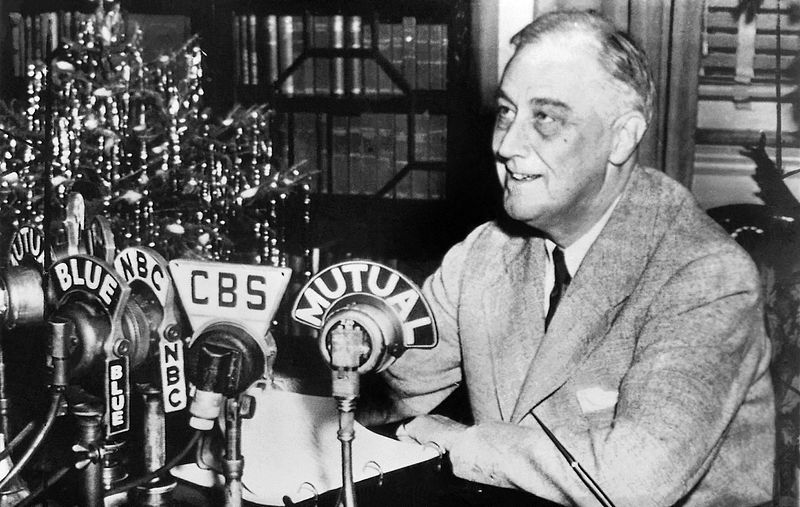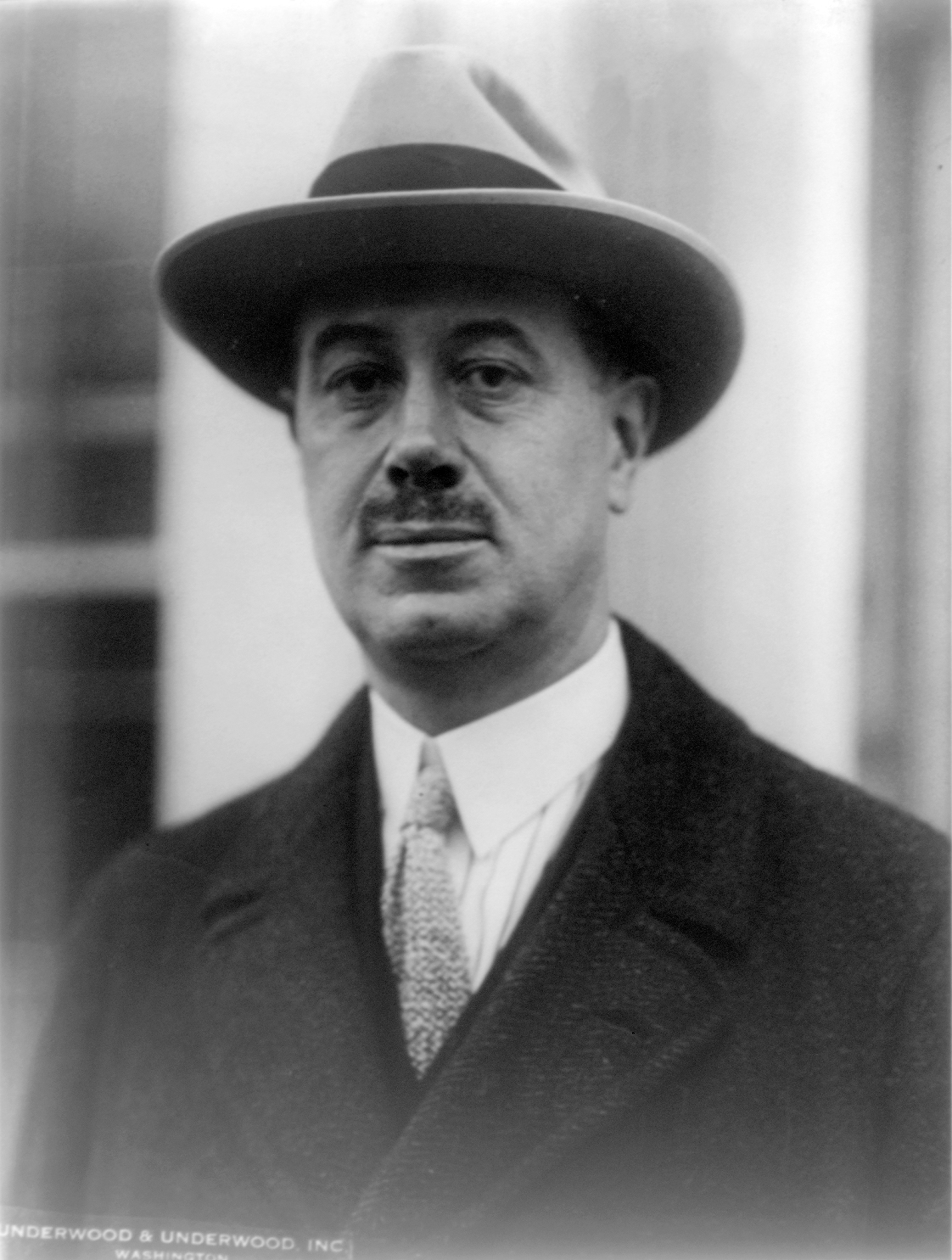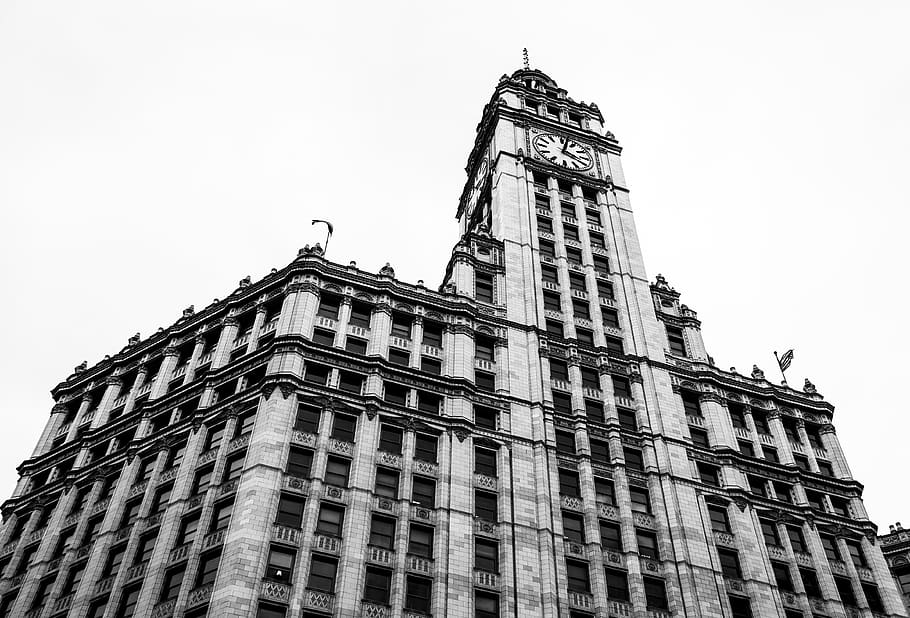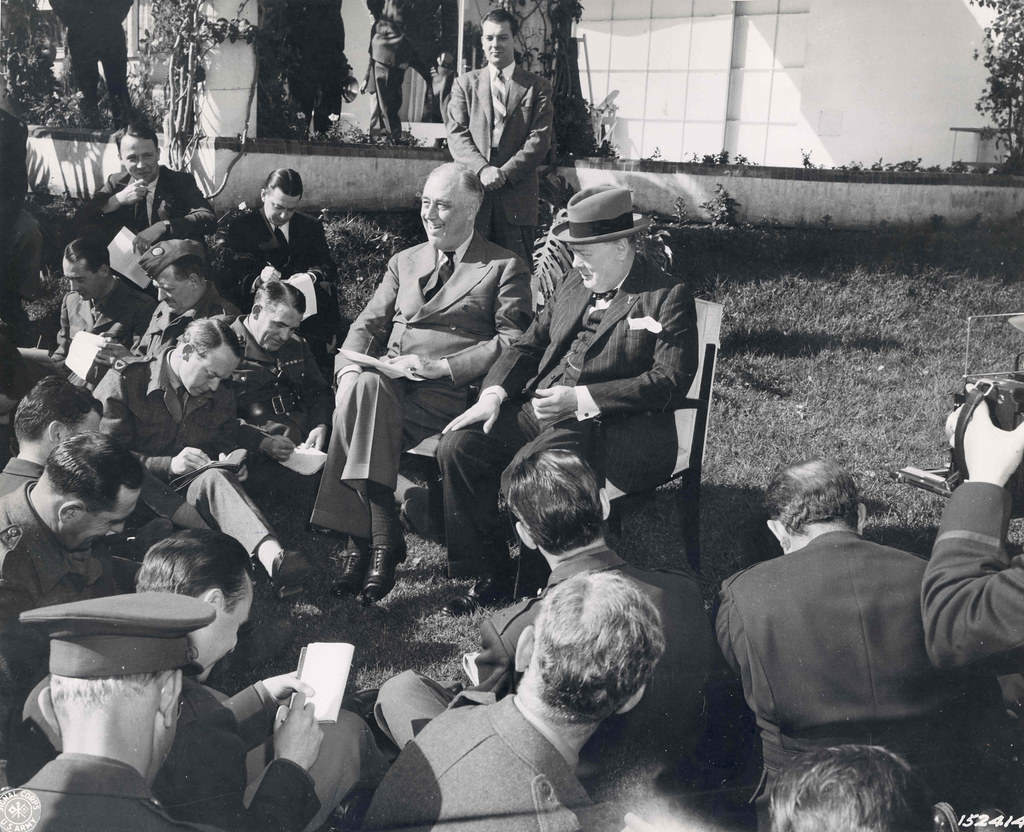FDR waged his own war on "fake news," specifically on the Chicago Tribune publisher Robert R. McCormick.
-
September 2020
Volume65Issue5
Editor's Note: Stephen Bates teaches First Amendment law, writing, and other subjects at the University of Nevada in Las Vegas. His latest book is An Aristocracy of Critics: Luce, Hutchins, Niebuhr, and the Committee That Redefined Freedom of the Press(Yale University Press), from which this essay was adapted.

Donald Trump is hardly the first president to wage war on the press. Thomas Jefferson denounced the “spirit of falsehood” driving newspaper publishers. Grover Cleveland said that newspaper lying reached new heights during his White House years. Both Woodrow Wilson and Harry Truman threatened to punch reporters for writing uncharitably about their daughters. Richard Nixon told his aides that the press is “the enemy.” But few battles equal the one between Franklin D. Roosevelt and the press, especially the Chicago Tribune and its quirky publisher, Robert R. McCormick.
Critics called McCormick one of the great minds of his time. Born in 1880, he studied at Groton and Yale and served with the American Expeditionary Force in World War I, rising to the rank of colonel, a title he used for the rest of his life. McCormick was an Ivy Leaguer wary of higher education. New York Times publisher Adolph Ochs once considered having the presidents of Harvard, Yale, and Princeton guide Times editorial policy. “I urged him very strongly against this,” McCormick said. Inconsistency, his biographer Richard Norton Smith points out, never troubled McCormick. When someone proposed adding a book section to the newspaper, he said no. “Readers of the Tribune don’t read books.” Yet during the Depression, the Tribune’s WGN aired highbrow radio shows produced by the Illinois Writers’ Project. In his spare time, McCormick scoured the Encyclopedia Britannica for errors. Why, he asked Britannica publisher William Benton in 1945, did the entry on plumbing omit Louis XIV’s celebrated pipe from Versailles to the Seine?
The Colonel’s eccentricities were legendary. Offended by the capriciousness of English spelling, he tried to fix it. The Tribune denounced “totalitarian philosofy” and government “burocrats.” Smith writes, “Whether the Colonel was brilliantly inventive or merely unhinged was a much debated topic around the Tribune.” Either way, the voice of the Tribune was the voice of the Colonel. The newspaper protected his friends—he assured New York Times publisher Arthur Hays Sulzberger (Ochs’s successor) that “nothing objectionable” to him “should appear in print in the Tribune”—and savaged his enemies. An isolationist, he especially despised the internationalist Henry Luce, editor in chief of Time Inc. In an article, not a column or editorial, the Tribune reported that “Luce, who wields dictatorial power over his magazines and nurses imperialistic ambitions that vie with those of a Mussolini, was born in China but is not a Chinaman.”
See also: "To Fix The Press," by Stephen Bates
McCormick also reviled everything British not named Winston Churchill. The Rhodes Scholarships, he maintained, were part of a plot to indoctrinate young Americans and turn them into undercover agents of their British spymasters. Above all, he loathed President Roosevelt. The New Deal, he believed, embodied “the spirit of the big red square in Moscow.” Liberals spoke of the unemployed as the forgotten Americans, but the real forgotten Americans, McCormick insisted, were the property owners. In 1936, Tribune operators answered the telephone with a countdown to the election: “Only 97 days left to save your country!”

In the mid-1930s, Leo Rosten solicited Washington correspondents’ views on American newspapers. Asked to name the most reliable paper, they cited the New York Times more often than any other. Asked to name the least reliable paper, they most frequently cited the Chicago Tribune or the Hearst papers. (The Tribune received one vote for most reliable. So did the Daily Worker.) When Rosten published his findings, the Tribune responded with a full-page ad lauding its Washington reporters and proclaiming that “in spite of fake statistics put out by reds and pinks, these men give you the real Washington news.”
The press, according to McCormick, serves a quasi-constitutional function. It uncovers and publicizes evidence of corruption in government and thereby operates as an external check on state power—hence the First Amendment. McCormick generously championed freedom of speech, including the rights of those with whom he disagreed. He financed the appeal of Jay Near, an anti-Semitic publisher in Minneapolis. In a landmark ruling in 1931, Near v. Minnesota, the Supreme Court held that prior restraints against the press are almost always unconstitutional.
By one estimate, McCormick spent $3 million protecting press freedom between the mid-1920s and the mid-1940s, prompting Fred Friendly to call him the “Daddy Warbucks of the First Amendment.” Under McCormick’s expansive view, the First Amendment prohibits not just interference with newspaper content but also any government action that, in his words, would “unreasonably decrease the return from publishing.” Sulzberger thought he was overreaching. The First Amendment, he wrote, “seems to me to refer to the spirit and not to our bodies. We are after all business enterprises, and our bodies are correctly subject to all the ills to which flesh or other industry may be heir.” For McCormick, body and spirit were one. He and the American Newspaper Publishers Association sought exemptions from rules governing collective bargaining, the minimum wage, maximum hours, child labor, false advertising, Social Security, and antitrust, but the courts generally enforced Sulzberger’s distinction. “The publisher of a newspaper,” the Supreme Court said, “has no special immunity from the application of general laws.”
Colonel McCormick viewed the National Industrial Recovery Act of 1933 as a particularly catastrophic breach of media autonomy. The NIRA directed industries to establish self-regulatory codes, to be vetted by the government. McCormick deemed the law an invitation to dictatorship and an unconstitutional regime for licensing the press. In a news conference, President Roosevelt scoffed that McCormick was “seeing things under the bed.”
Grudgingly, newspaper publishers drafted the required self-regulatory code, but they included a caveat stating that they did not “consent to the imposition of any requirements that might restrict or interfere with the constitutional guarantee of the freedom of the press.” The president and his aides resented the insinuation that they were trying to subvert the Constitution. In a testy statement approving the code, Roosevelt dismissed the provision on press freedom as “pure surplusage” with no legal effect. His administration would protect freedom of expression, he said, but “not freedom to work children, or do business in a fire trap or violate the laws against obscenity, libel and lewdness.” General Hugh S. Johnson headed the agency in charge of implementing the NIRA, the National Recovery Administration. In a speech, Johnson said that when he took the job, he knew “the early applause would cease and soon the air would be full of dead cats.” He had no objection to “really honest and substantial dead cats,” he said, but “most of these dead cats are synthetic,” especially “the one about the freedom of the press.”
FDR was lucky in his media enemies. The loopy accusations advanced by Colonel McCormick and the newspaper publishers’ organization enabled the president to dismiss all his opponents in the press as loopy. They also drew attention away from FDR’s eagerness to use federal power to punish his enemies in the press. McCormick may have imagined many machinations and conspiracies, but when he said in 1942 that “the administration is out to get the Tribune,” he was right. FBI agents installed wiretaps on the phones in the newspaper’s Washington bureau. After hearing rumors that McCormick had exaggerated his World War I exploits, the president ordered the War Department to send over his records. The Tribune began having trouble getting newsprint from its Canadian paper mills. Adviser Harold Ickes tried to persuade FDR to have the Canadian government shutter the mills on the ground that the Tribune was lending aid and comfort to the enemy. Although that didn’t happen, the War Production Board did impose quotas on the supply of newsprint. It let other Chicago newspapers exceed their quotas but not the Tribune.

Then there was what the journalism historian Margaret A. Blanchard calls the administration’s “highly personal and political” antitrust case against the Associated Press. In 1941, with the president’s encouragement, Marshall Field III launched the pro-administration Chicago Sun. (Field also financed the proadministration PM in New York.) Under the wire service’s bylaws at the time, an Associated Press member often could prevent competing papers from getting AP service. The Tribune vetoed the Sun’s application to join the AP. The president discussed the issue with Field, after which the Justice Department launched an investigation.
FBI agents questioned Colonel McCormick and other AP board members, leaving some feeling strong-armed. The administration filed a civil antitrust suit against the AP and threatened to prosecute board members for criminal violations if they didn’t back down. In a meeting, antitrust enforcer Thurman Arnold told Colonel McCormick that the goal of the investigation was to seek his indictment. The antitrust case was justifiable—the Supreme Court ruled that the AP had violated antitrust law—but not the threats or the president’s involvement.
The administration investigated the Tribune for criminal prosecution on other occasions as well. A few days before Pearl Harbor, at a time when the president insisted that he had no intention of getting involved in the European war, the Tribune revealed secret contingency plans to invade the Continent. The FBI investigated the leak, and Ickes urged that the newspaper company be prosecuted for treason, though nothing came of it. After the Battle of Midway in 1942, the Tribune implied, accurately, that the United States had broken the Japanese code. FDR considered sending Marines to Chicago to occupy Tribune Tower.

The Justice Department appointed a special prosecutor, who recommended dropping the case, but Roosevelt overruled him. Ultimately, the grand jury voted not to indict the paper. In addition, at FDR’s urging, the Justice Department considered charging the Tribune with sedition based on a wartime content analysis. Social scientists in the Experimental Division for the Study of War Time Communications, housed in the Library of Congress, compared Tribune articles to Axis propaganda.
They found that some of the Tribune’s anti-Roosevelt themes overlapped with the anti-America themes of the Axis. Both contended that communists ran the U.S. government, that FDR was corrupt, and that the administration was bungling the war effort. Intent, said a Justice Department attorney, shouldn’t matter: “Whether this is deliberately contrived by seditious elements or is the honest view of patriotic but blind Americans is of minor importance; the result is the same.” No prosecution took place, but when Radio Tokyo quoted McCormick’s charges of incompetence in the American war effort, FDR in a Fireside Chat condemned “bogus patriots who use the sacred freedom of the press to echo the sentiments of the propagandists in Tokyo and Berlin.”
The president also targeted two newspapers controlled by cousins of Colonel McCormick: the New York Daily News, run by Joseph Patterson, and the Washington Times-Herald, run by Eleanor “Cissy” Patterson. Roosevelt referred to the “McCormick-Patterson axis.” On one occasion, he pretended to confer an Iron Cross on John O’Donnell of the Daily News.
The president’s allies reinforced the attacks. Librarian of Congress Archibald MacLeish, a poet and playwright, publicly charged that newspaper critics of the Roosevelt administration were wartime defeatists, saboteurs, and traitors. Anticipating Trump’s contention that the news media are “the enemy of the American People,” MacLeish said that a publisher who knowingly publishes falsehoods is “an enemy of the state.” Alongside his position as Librarian of Congress, MacLeish ran the Office of Facts and Figures, an agency created in mid-1941 to inform the public about the government’s readiness for war. In mid-1942, the administration announced that OFF would be replaced by the Office of War Information. The Washington Times-Herald published an article by Cissy Patterson about MacLeish (“The Bald Bard of Balderdash”) and his “array of literary floosies.” She called on Americans to celebrate the “joyful whiz-bang” of MacLeish’s downfall on Independence Day. The Chicago Tribune quoted Patterson’s article at length.
“I have achieved the ultimate in something,” MacLeish wrote in a note to President Roosevelt. The Tribune, he said, had proclaimed that “the chief significance of this year’s Fourth of July is the fact that the country has gotten rid of / Yours always, / Archie!”
The president replied that McCormick and the Pattersons “deserve neither hate nor praise—only pity for their unbalanced mentalities.”

